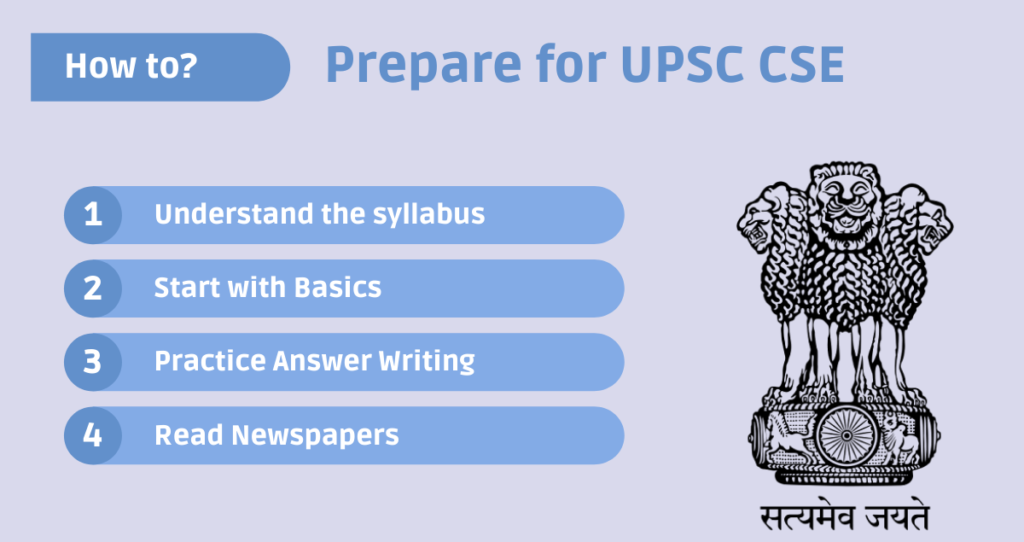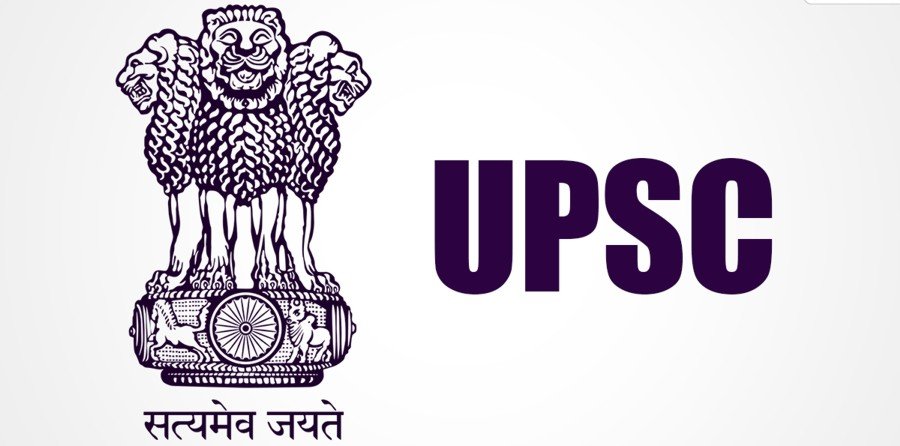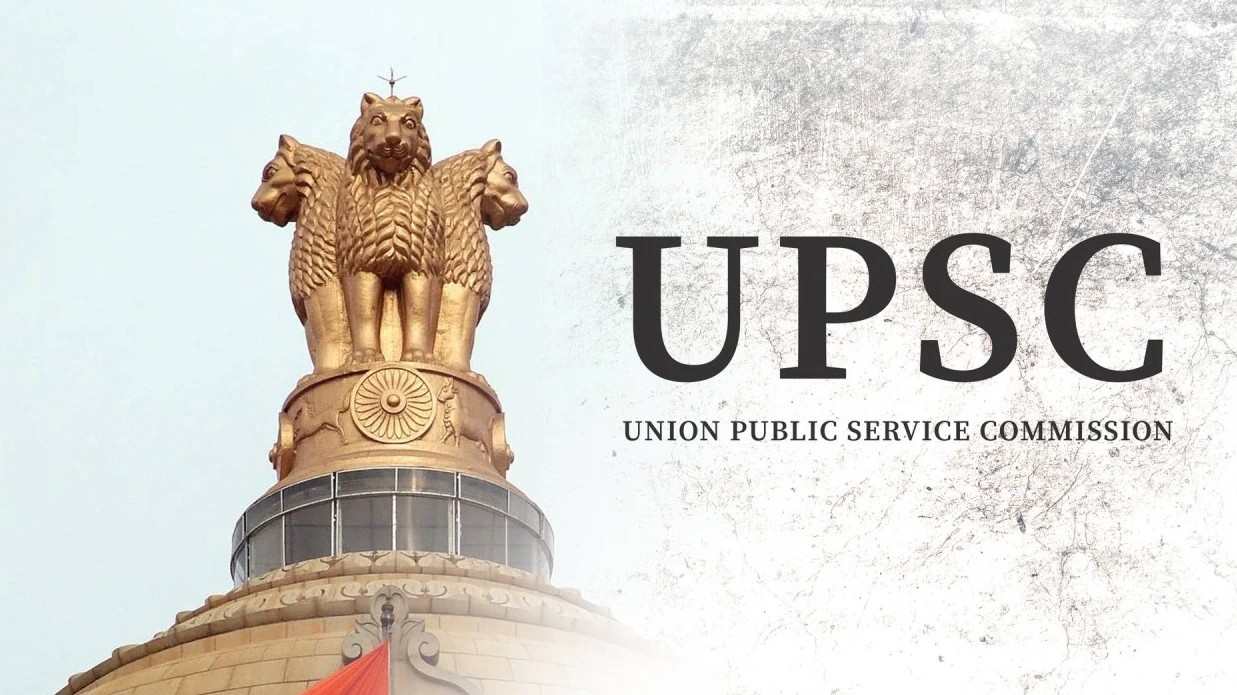Dreaming of becoming a civil servant and contributing to the nation? Then you must be curious about how to prepare for UPSC effectively. You’re not alone! Every year, thousands of aspirants set their sights on the Union Public Service Commission (UPSC) exam. But for many beginners, the process can seem overwhelming. Fear not! This comprehensive guide will break down everything you need to know and help you understand how to prepare for UPSC step by step.
Whether you are just starting your UPSC preparation or want to gain a clearer picture of what lies ahead, this blog will help you grasp the essentials and provide you with practical tips on how to prepare for UPSC.
To Know more Click Here
Table of Contents

What is UPSC? Why is It Important?
Before diving into the details of how to prepare for UPSC, let’s first understand what UPSC is and why it’s so significant. The Union Public Service Commission (UPSC) conducts the Civil Services Examination (CSE) to recruit officers for various services like the Indian Administrative Service (IAS), Indian Police Service (IPS), Indian Foreign Service (IFS), and more.
The UPSC exam is known for its vast syllabus and fierce competition, making it one of the toughest exams in the country. But once you learn how to prepare for UPSC, you’ll realize it’s all about having the right strategy and persistence. The rewards of clearing the exam are immense: a secure and prestigious job, the ability to serve your country, and a significant role in policymaking.
The Three Stages of the UPSC Exam
To know how to prepare for UPSC, it’s crucial to understand the exam structure. The Civil Services Examination is conducted in three stages:
1. Prelims
This is the first hurdle in your UPSC journey. The Preliminary Examination consists of two papers:
- General Studies Paper I: Covers a wide array of subjects such as history, geography, economics, and current affairs.
- CSAT (Civil Services Aptitude Test): Tests your logical reasoning, comprehension, and basic numeracy skills.
Tip for Prelims: Many beginners overlook CSAT since it’s qualifying in nature, but you must ensure you cross the qualifying marks.
2. Mains
The Mains exam is a written, descriptive examination consisting of nine papers:
- Four General Studies Papers: Cover subjects like Indian heritage, governance, ethics, and international relations.
- One Optional Subject: Choose from a list of over 40 subjects.
- Essay Paper: Write essays on topics that test your critical thinking and depth of understanding.
- Two Language Papers: One in English and one Indian language.
3. Interview (Personality Test)
The final stage is the Personality Test, or interview. It’s not just about knowledge but how you present yourself, your opinions, and how well-rounded your personality is.
Understanding the format is a key step in how to prepare for UPSC successfully.

Step 1: Understanding the Syllabus
If you want to know how to prepare for UPSC, the first thing to do is master the syllabus. The UPSC syllabus is your map to success, so familiarize yourself with it right from the start.
Why Is the Syllabus So Important?
Without thoroughly understanding the syllabus, your preparation can become aimless. The key to cracking UPSC is to prepare in alignment with the syllabus. Everything you study should come directly from the UPSC syllabus, ensuring that your effort is not wasted on irrelevant topics.
Break Down the Syllabus
Print out the UPSC syllabus and categorize it into manageable sections:
- Static subjects like History, Geography, and Polity, which remain largely unchanged.
- Dynamic topics like Current Affairs, which require regular updates from reliable sources.
Step 2: Crafting an Effective Study Plan
Wondering how to prepare for UPSC without feeling overwhelmed? The secret lies in having a realistic and well-structured study plan. A good study plan not only helps you cover the vast syllabus but also keeps you organized and focused.
Setting Goals
To create a successful study plan, set clear, achievable goals. Ask yourself how many months you have before the Prelims and Mains and plan accordingly. Divide your time between different subjects, revision, and mock tests.
- Daily Goals: Break down your tasks into small, achievable chunks. For instance, study one chapter of history, solve 20 MCQs, and review current affairs daily.
- Weekly Goals: Aim to complete one major section of General Studies every week.
Mixing Subjects
When planning how to prepare for UPSC, don’t study one subject for too long. Instead, mix your subjects—study history in the morning, current affairs in the afternoon, and geography in the evening. This way, you’ll keep your preparation dynamic and engaging.
Step 3: Choosing the Right Study Materials
One of the most frequently asked questions by beginners is: “What should I study?” The answer to how to prepare for UPSC lies in choosing the right books and resources.
NCERTs First
Your foundation should be built on NCERT books. These books are easy to understand and provide a strong conceptual base across subjects.
- History: NCERTs from classes 6-12
- Geography: NCERTs from classes 6-12
- Polity: NCERT books, followed by standard reference books like Indian Polity by M. Laxmikanth.
Standard Books for UPSC
After NCERTs, move on to standard books for deeper knowledge:
- History: India’s Struggle for Independence by Bipan Chandra.
- Economics: Indian Economy by Ramesh Singh.
- Environment: Environment by Shankar IAS.
Choosing the right resources is essential when deciding how to prepare for UPSC efficiently.
Step 4: Importance of Current Affairs
Current affairs are the backbone of your UPSC preparation, so understanding how to prepare for UPSC means dedicating time every day to staying updated.
How to Keep Up With Current Affairs
- Read Newspapers: Newspapers like The Hindu or The Indian Express should be your daily companion.
- Watch News Analysis: Channels like Rajya Sabha TV offer in-depth discussions on important national and international issues.
- Magazines: Monthly magazines like Yojana and Kurukshetra offer detailed insights into government policies and social issues.
Make Your Own Notes
As you read, make concise notes. Writing helps you retain information and makes revision easier. Revisiting your notes frequently is a crucial part of how to prepare for UPSC.
Step 5: Managing Your Time Effectively
Knowing how to prepare for UPSC isn’t just about covering the syllabus; it’s about doing so efficiently. Time management is your best friend during UPSC preparation.
Stick to a Schedule
Create a timetable that balances all subjects. Dedicate specific time slots for reading, revising, and practicing mock tests. Also, ensure you have time for current affairs every day.
Avoid Burnout
Study in intervals. The Pomodoro technique (25 minutes of focused study followed by a 5-minute break) can help maintain your productivity without exhausting yourself.
Step 6: Practicing for Mains Answer Writing
A big part of understanding how to prepare for UPSC involves mastering the art of writing answers for Mains. The Mains exam is subjective, so writing practice is essential.
Start Early
Don’t wait until after the Prelims to start practicing answer writing. Pick previous years’ Mains questions and write answers in a timed environment. Focus on structure, clarity, and presenting balanced arguments.
Get Feedback
Have your answers reviewed by a mentor or peer to improve. Constructive criticism helps you refine your approach and make your answers more effective.
Step 7: The Role of Mock Tests
No UPSC preparation is complete without mock tests. Understanding how to prepare for UPSC means knowing when to take tests to evaluate your progress.
Prelims Mock Tests
Regularly solve Prelims mock tests to familiarize yourself with the question format and manage time efficiently.
Mains Mock Tests
For Mains, join a test series where your answers are evaluated. These mock tests not only build your confidence but also highlight areas that need improvement.
Step 8: Preparing for the UPSC Interview
The interview stage is where your knowledge meets your personality. Knowing how to prepare for UPSC interviews is
about more than just facts.
Mock Interviews
Attend mock interviews to practice articulating your thoughts clearly and confidently. UPSC looks for candidates who are well-rounded, with good communication skills and clear opinions.
Be Honest
When answering questions, be honest. If you don’t know something, admit it. Bluffing your way through can damage your credibility.
Staying Motivated: Handling Stress
Preparing for UPSC can be a long and draining process. Consistency is key, and staying motivated is a critical component of how to prepare for UPSC.
Join a Study Group
Study groups or online forums can provide support when you feel demotivated. Discussing ideas and sharing resources with peers can help rejuvenate your motivation.
Take Care of Your Mental Health
Take regular breaks, meditate, or indulge in hobbies. Keeping your mind fresh is just as important as covering the syllabus when figuring out how to prepare for UPSC.
want to know about Top Government Exams in 2025 for Students
visit our blog: top-government-exams-in-2025-for-students

Conclusion: Your Ultimate Roadmap to Success
Now that you have a detailed understanding of how to prepare for UPSC, it’s time to take action. Remember, UPSC is not about how much you study but how smartly and consistently you work toward your goal. Create a study plan, stick to it, and practice regularly.
The road to success might seem long, but with the right approach and determination, you can crack UPSC. Now is the time to start your journey. Download the UPSC syllabus, pick up the first book, and begin. Good luck!






